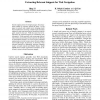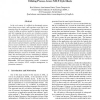1310 search results - page 203 / 262 » Modelling and Using Imperfect Context Information |
AAAI
2008
15 years 4 days ago
2008
Search engines present fix-length passages from documents ranked by relevance against the query. In this paper, we present and compare novel, language-model based methods for extr...
WWW
2003
ACM
15 years 10 months ago
2003
ACM
The World Wide Web has not only revolutionized the area of traditional hypermedia, it is also starting to influence adaptive hypermedia research. The main feature of the World Wid...
GECCO
2003
Springer
15 years 3 months ago
2003
Springer
The process of labeling each word in a sentence with one of its lexical categories (noun, verb, etc) is called tagging and is a key step in parsing and many other language processi...
WECWIS
2002
IEEE
15 years 2 months ago
2002
IEEE
In the web context, it is difficult to disentangle presentation from process logic, and sometimes even data is not separate from the presentation. Consequently, it becomes to de�...
109
click to vote
ACSAC
2000
IEEE
15 years 2 months ago
2000
IEEE
This contribution discusses a network-level access control technique that applies the non-discretionary access control model to individual data packets that are exchanged between ...


